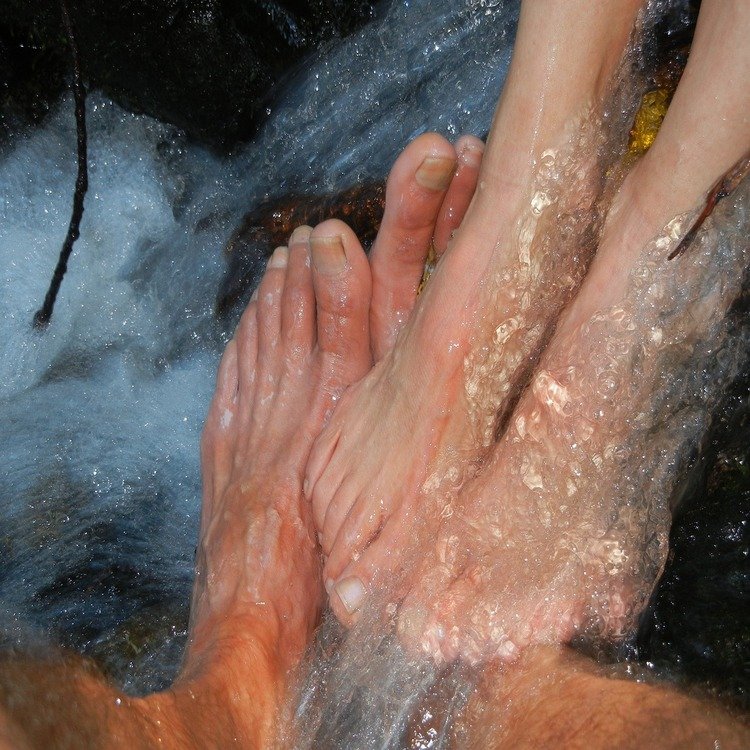
Dietrich Bonhoeffer exemplifies the spirit of humility and service, emphasizing the importance of foot washing in Christian life.
100+ Bonhoeffer Foot Washing Quotes: Unlock the True Meaning of Service & Faith!
Dietrich Bonhoeffer, a prominent theologian and martyr of the 20th century, left an indelible mark on Christian thought through his profound teachings on humility, service, and discipleship. His reflections on the act of foot washing, in particular, offer a rich tapestry of insights that continue to challenge and inspire believers today. In this comprehensive compilation, we present over 100 Bonhoeffer Foot Washing Quotes, organized into categories, to explore the depth and breadth of his teachings on this powerful symbol of Christian faith and practice.
Understanding Dietrich Bonhoeffer: A Life of Faith and Courage
Before we discuss Bonhoeffer’s footwashing quotes, it’s crucial to understand the man behind these profound insights. Dietrich Bonhoeffer, born in 1906, quickly became one of the most influential theologians of the 20th century. His life was marked by an unwavering commitment to living out his faith, even in extreme adversity.
Bonhoeffer’s theological journey was shaped by his experiences in Nazi Germany, where he stood as a vocal opponent of the regime’s atrocities. His involvement in a plot to assassinate Adolf Hitler ultimately led to his imprisonment and execution, but not before he left an indelible mark on Christian thought through his writings and teachings
“The ultimate test of a moral society is the kind of world that it leaves to its children.” – Dietrich Bonhoeffer
While not directly about foot washing, this quote encapsulates Bonhoeffer’s broader vision of a faith that actively engages with and transforms society. Within this context, we must understand his teachings on humility, service, and the profound act of foot washing.

- Foot Washing and Humility
- “The Christian will find in the humility of the Cross the strength to wash the feet of others.”
- “Humility in service is the true measure of a great heart.”
- “We are all called to serve each other in love, just as Christ did when he washed the disciples’ feet.”
- “Humility is not about being humble for show; it is about serving others in quiet love.”
- “True humility does not know that it is humble. If it did, it would be proud from the contemplation of so fine a virtue.”
- “The greatest among you will be your servant.”
- “Humility is the source of all true greatness; pride is ever impatient and pretentious.”
- “In true humility, we find the strength to serve others without seeking recognition.”
- “The act of foot washing reminds us that true leadership begins with humility.”
- “Humility is not thinking less of yourself, but of yourself less.”
- “In the humility of foot washing, we find the essence of Christ’s love.”
- “True humility is born from a deep understanding of God’s grace.”
- “The path of humility leads to the heart of Christian service.”
- “In washing feet, we learn to see others as Christ sees them.”
- “Humility is the foundation upon which all other virtues are built.”
- “The humble act of foot washing teaches us to value others above ourselves.”
- “In humility, we find the strength to serve even those who may not appreciate it.”
- “True humility is not self-deprecation, but a realistic assessment of our place before God.”
- “The act of foot washing reminds us that no task is beneath a true disciple of Christ.”
- “Humility in service is the hallmark of authentic Christian leadership.”
- Service and Christian Discipleship
- “The path to greatness is found in serving others.”
- “Christianity means community through Jesus Christ and in Jesus Christ. No Christian community is more or less than this.”
- “The service one performs in genuine love carries a blessing within itself.”
- “It is only with gratitude that life becomes rich, and it is in serving others that one finds true richness.”
- “The way to serve God is to serve others, and the way to love God is to love others.”
- “Discipleship means allegiance to the suffering Christ, and it is therefore not surprising that Christians should be called upon to suffer.”
- “The community of faith does not need brilliant personalities but faithful servants of Jesus and one another.”
- “When Christ calls a man, he bids him come and die.”
- “The church is the church only when it exists for others.”
- “Action springs not from thought, but from a readiness for responsibility.”
- “In serving others, we find our true purpose as disciples of Christ.”
- “True discipleship is measured not by words, but by acts of service.”
- “The call to discipleship is a call to serve, even when inconvenient.”
- “In washing feet, we learn that no act of service is too small for a disciple of Christ.”
- “Discipleship without service is merely religious theory.”
- “The mark of a true disciple is found in their willingness to serve others.”
- “Service is not an option for the Christian; it’s the essence of our calling.”
- “In serving others, we participate in the ongoing ministry of Christ.”
- “True discipleship is lived out in the everyday acts of service to others.”
- “The path of discipleship leads us to the feet of others, ready to serve.”
- Community and Service
- “The Christian must treat his neighbour as a man who has been redeemed by Christ and come to him in profound reverence.”
- “We must learn to regard people less in the light of what they do or omit to do and more in the light of what they suffer.”
- “The first service one owes to others in a community involves listening to them.”
- “He who loves his dream of a community more than the Christian community itself becomes a destroyer of the latter.”
- “Christian brotherhood is not an ideal which we must realize; it is rather a reality created by God in Christ in which we may participate.”
- “The person who loves their dream of community will destroy community, but the person who loves those around them will create community.”
- “In a Christian community, everything depends upon whether each individual is an indispensable link in a chain.”

- “The community of faith is built on mutual service and humility.”
- “True community is forged in the crucible of shared service.”
- “In serving one another, we build a community that reflects Christ’s love.”
- “The strength of a community is measured by its willingness to serve its weakest members.”
- “Community without service is merely a gathering; service creates true fellowship.”
- “In washing each other’s feet, we learn the true meaning of community.”
- “A community that serves together grows together in Christ.”
- “The act of foot washing reminds us that we are all equal in God’s community.”
- “True community is found not in grand gestures, but in humble acts of service.”
- “In serving one another, we create a community that can withstand any storm.”
- “The community that serves together reflects the heart of Christ to the world.”
- “Foot washing teaches us that true community is built on mutual submission and service.”
- “In the community of faith, every member is called to be both servant and served.”
- Costly Grace and Discipleship
- “Cheap grace is the preaching of forgiveness without requiring repentance, baptism without church discipline, Communion without confession, absolution without personal confession. Cheap grace is grace without discipleship, grace without the Cross, grace without Jesus Christ, living and incarnate.”
- “Costly grace is the treasure hidden in the field; for the sake of it, a man will go and sell all that he has. It is the pearl of great price to buy which the merchant will sell all his goods.”
- “Costly grace is the gospel which must be sought again and again, the gift which must be asked for, the door at which a man must knock.”
- “Such grace is costly because it calls us to follow, and it is grace because it calls us to follow Jesus Christ.”
- “Costly grace confronts us as a gracious call to follow Jesus; it comes as a word of forgiveness to the broken spirit and the contrite heart.”
- “Discipleship is not limited to what you can comprehend – it must transcend all comprehension.”
- “The Cross is laid on every Christian. It begins with the call to abandon the attachments of this world.”
- “Costly grace demands true discipleship, which includes the willingness to serve as Christ served.”
- “In the act of foot washing, we see the cost of true discipleship – the willingness to humble ourselves for others.”
- “Costly grace calls us to a life of service, not just a moment of conversion.”
- “True discipleship, like foot washing, requires us to set aside our pride and serve others.”
- “The cost of discipleship is measured in our willingness to serve, even when it’s uncomfortable.”
- “Foot washing reminds us that costly grace demands action, not just belief.”
- “In embracing costly grace, we find the strength to serve others as Christ served us.”
- “True discipleship is lived out in the everyday acts of humble service to others.”
- “Costly grace calls us to a life of active service, not passive acceptance.”
- “The path of discipleship leads us to the feet of others, ready to serve as Christ served.”
- “In foot washing, we see the embodiment of costly grace – love in action.”
- “Costly grace demands that we not only receive Christ’s love but also actively demonstrate it to others.”
- “True discipleship is marked by a willingness to serve others, regardless of the personal cost.”
- Leadership and Service
- “Jesus Christ lived in the midst of his enemies. In the end, all his disciples deserted him. On the Cross, he was utterly alone, surrounded by evildoers and mockers. For this cause, he had come to bring peace to the enemies of God. So the Christian, too, belongs not in the seclusion of a cloistered life but in the thick of foes.”

- “The true leader serves others, not himself.”
- “Leadership is not about power but empowering others through service.”
- “In washing feet, Jesus redefined leadership for all time.”
- “True Christian leadership is always servant leadership.”
- “The greatest leader is the one who is willing to wash the feet of others.”
- “Leadership in the kingdom of God is measured by one’s willingness to serve.”
- “The act of foot washing teaches us that true authority comes through humility.”
- “In serving others, we find the true essence of Christian leadership.”
- “Leadership that doesn’t serve is not leadership at all; it’s domination.”
- “The mark of a great leader is found in their willingness to serve the least.”
- “Foot washing reminds us that leadership is about lifting others, not elevating ourselves.”
- “True leadership, like foot washing, requires us to kneel before those we lead.”
- “In the kingdom of God, the greatest leaders are servants.”
- “Leadership that follows Christ’s example always leads with a towel and basin.”
- “The act of foot washing teaches leaders to value and honour those they serve.”
- “Christian leadership is not about being first but putting others first.”
- “In washing feet, we learn that true leadership is about empowering others.”
- “The most effective leaders are those who are not afraid to serve in the most humble ways.”
- “Foot washing reminds leaders that their authority comes from their willingness to serve.”
Conclusion: The Enduring Relevance of Bonhoeffer’s Teachings on Foot Washing
Dietrich Bonhoeffer’s profound reflections on foot washing, humility, service, and discipleship resonate deeply with Christians today. His teachings challenge us to move beyond superficial faith and embrace a Christianity lived out in practical, often sacrificial, acts of service.
Bonhoeffer’s emphasis on costly grace reminds us that true discipleship comes at a price. It demands more than mere intellectual assent to Christian doctrines; it requires a willingness to follow Christ’s example of humble service, even when it’s uncomfortable or costly. As Bonhoeffer understood it, the act of foot washing is a powerful symbol of this costly grace – a tangible reminder of our call to serve others in love and humility.
His insights on community and service are particularly relevant in our increasingly individualistic society. Bonhoeffer’s vision of a Christian community, built on mutual service and love, offers a compelling alternative to the isolation and self-centeredness that often characterize modern life. In this context, foot washing becomes a powerful tool for building authentic communities and fostering genuine relationships.
Bonhoeffer’s teachings on leadership challenge contemporary notions of power and authority. His emphasis on servant leadership provides a radical, Christ-centred alternative in a world that often equates leadership with dominance and control. The image of Jesus washing his disciples’ feet becomes a model for Christian leadership rooted in humility and focused on empowering others. Perhaps most importantly, Bonhoeffer’s reflections on foot washing remind us of the transformative power of humble service. In a culture that often values status and achievement above all else, washing another’s feet – or engaging in any form of sacrificial service – can reshape our understanding of greatness and success. Reflecting on Bonhoeffer’s teachings, we are challenged to examine our lives and faith communities. Are we willing to embrace the costly grace that calls us to serve others? Are we building communities characterized by mutual love and service? Are we leading in ways that empower and uplift others?
In conclusion, Bonhoeffer’s teachings on foot washing offer us a profound and challenging vision of Christian faith and practice. They call us to a life of active love, humble service, and authentic community. As we seek to live out these teachings in our contexts, may we, like Bonhoeffer, have the courage to embody Christ’s love in tangible, transformative ways. In doing so, we honour Bonhoeffer’s legacy and, more importantly, faithfully follow in the footsteps of the One who came not to be served but to serve.



